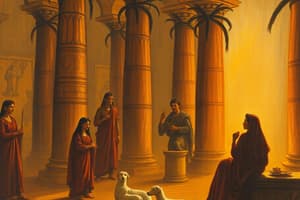Podcast
Questions and Answers
¿Qué función tuvo el comercio para la supervivencia del antiguo Egipto?
¿Qué función tuvo el comercio para la supervivencia del antiguo Egipto?
- No tuvo relevancia para la economía egipcia
- Permitió obtener bienes no producidos localmente (correct)
- Favoreció la autarquía del país
- Limitó el desarrollo de la civilización egipcia
¿Qué sistema económico operaba en el antiguo Egipto antes de la invasión persa en 525 a.C.?
¿Qué sistema económico operaba en el antiguo Egipto antes de la invasión persa en 525 a.C.?
- Economía socialista
- Economía de mercado
- Economía de trueque (correct)
- Economía basada en el dinero
¿Qué caracterizó la arquitectura monumental del antiguo Egipto?
¿Qué caracterizó la arquitectura monumental del antiguo Egipto?
- Desconocimiento de técnicas de construcción
- Influencias griegas prominentes
- Uso extensivo de madera en las construcciones
- Muestra de habilidades ingenieriles avanzadas (correct)
¿En qué campo se destacaron los antiguos egipcios en términos artísticos?
¿En qué campo se destacaron los antiguos egipcios en términos artísticos?
¿Durante qué período histórico egipcio se produjo un resurgimiento de la religión y las artes?
¿Durante qué período histórico egipcio se produjo un resurgimiento de la religión y las artes?
¿Cuál era la estructura básica de la sociedad egipcia antigua?
¿Cuál era la estructura básica de la sociedad egipcia antigua?
¿Cuál de las siguientes afirmaciones sobre las mujeres en el antiguo Egipto es incorrecta?
¿Cuál de las siguientes afirmaciones sobre las mujeres en el antiguo Egipto es incorrecta?
¿Cuál de las siguientes contribuciones NO es atribuida a la antigua civilización egipcia?
¿Cuál de las siguientes contribuciones NO es atribuida a la antigua civilización egipcia?
¿Cuál de los siguientes NO era un aspecto clave de la economía egipcia antigua?
¿Cuál de los siguientes NO era un aspecto clave de la economía egipcia antigua?
¿Cuál de las siguientes afirmaciones sobre la historia del antiguo Egipto es correcta?
¿Cuál de las siguientes afirmaciones sobre la historia del antiguo Egipto es correcta?
Flashcards are hidden until you start studying
Study Notes
Ancient Egypt: Society, Economy, Contributions, and History
Introduction
Ancient Egypt was a remarkable civilization that thrived along the Nile River for over 3,000 years, leaving behind a legacy that continues to inspire and captivate us today. This comprehensive guide delves into the fascinating aspects of Egyptian society, economy, contributions, and history, offering unique insights into the world's oldest continuous civilization.
Society
The Egyptian society was structured around the concept of hierarchy, with the Pharaoh at the top, followed by nobles, priests, scribes, and soldiers. At the bottom of the pyramid were the ordinary people, who were primarily farmers and laborers. However, despite the apparent rigidity of the social structure, it was not as inflexible as once believed. Evidence suggests that social mobility was possible, particularly for skilled individuals, such as physicians, craftsmen, and musicians, who could rise in status through talent and hard work.
Women in ancient Egypt had significant roles in society, participating in various aspects of daily life. Women worked alongside men in agriculture, industry, and craftsmanship, engaging in activities like spinning, weaving, metalworking, and jewelry making. Additionally, women played essential roles in the household, preparing food, managing the family, and caring for children. Some women even held positions of power and prestige, serving as priestesses, queens, and even rulers themselves.
Economy
For most of its history, ancient Egypt operated on a barter system without cash. Goods and services were valued using a measurement called the deben, which functioned similarly to our modern-day dollar. Only after the Persian invasion in 525 BCE was a cash economy introduced, leading to increased trade and commercialization.
Trade was essential for the survival of ancient Egypt, as it allowed the country to obtain goods it didn't produce locally. Early trade routes connected Upper and Lower Egypt, eventually expanding to neighboring lands like Mesopotamia and beyond. During the New Kingdom, Egyptian trade extended across the Mediterranean, where goods like textiles, timber, glassware, and other commodities were exchanged for precious metals, wine, oil, and livestock.
Contributions
Ancient Egypt stands out for its monumental architecture, including pyramids, temples, and tombs. These structures showcase the civilization's advanced engineering skills, as well as its reverence for the eternal life of the soul. Egyptian mathematics and geometry, used in constructing these architectural marvels, laid the groundwork for further advancements in these fields.
In terms of art, the ancient Egyptians excelled in sculpture, painting, and jewelry making. Their iconography, rooted in mythology and religion, has influenced subsequent artistic traditions worldwide. Furthermore, Egypt's rich literary heritage includes storied texts that continue to inspire contemporary literature and film, such as the famous Book of the Dead.
History
The history of ancient Egypt spans over 3,000 years, from the Predynastic Period around 6000 BCE to the end of the Late Antique period in 646 CE. During this time, Egypt experienced periods of political stability, cultural achievements, and external invasions, resulting in significant shifts in its social, economic, and religious fabric.
One of the most influential periods in Egyptian history was the New Kingdom (1570-1070 BCE). This era saw the rise of powerful pharaohs who expanded the empire and embraced trade, fostering connections with neighboring civilizations. The New Kingdom's cultural achievements, including a revival of religion and the arts, continue to shape our perception of ancient Egypt.
Studying That Suits You
Use AI to generate personalized quizzes and flashcards to suit your learning preferences.




